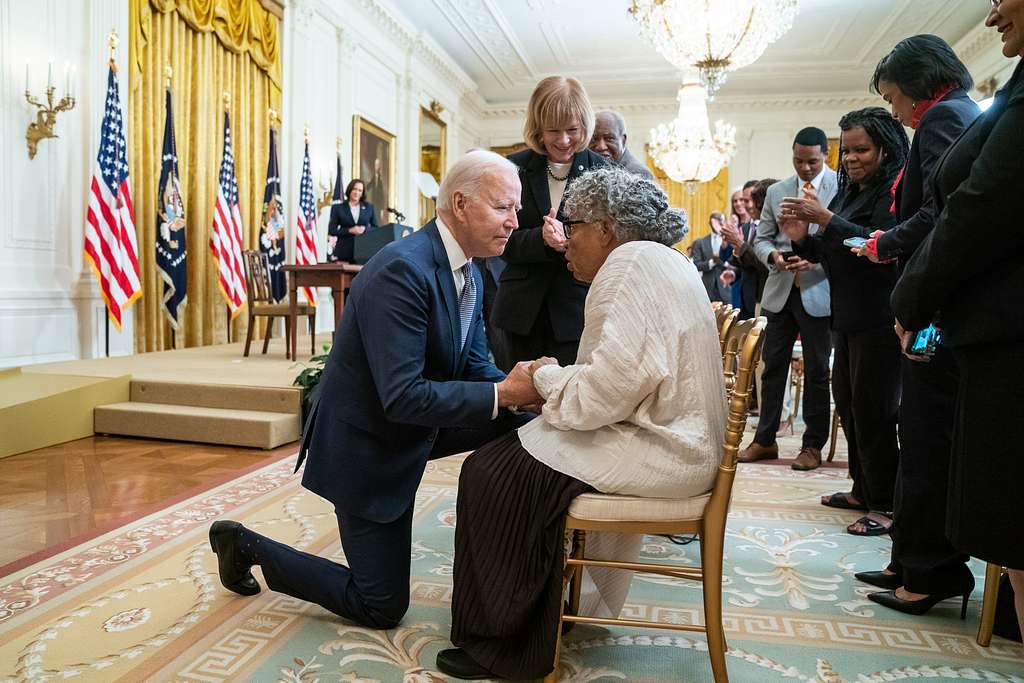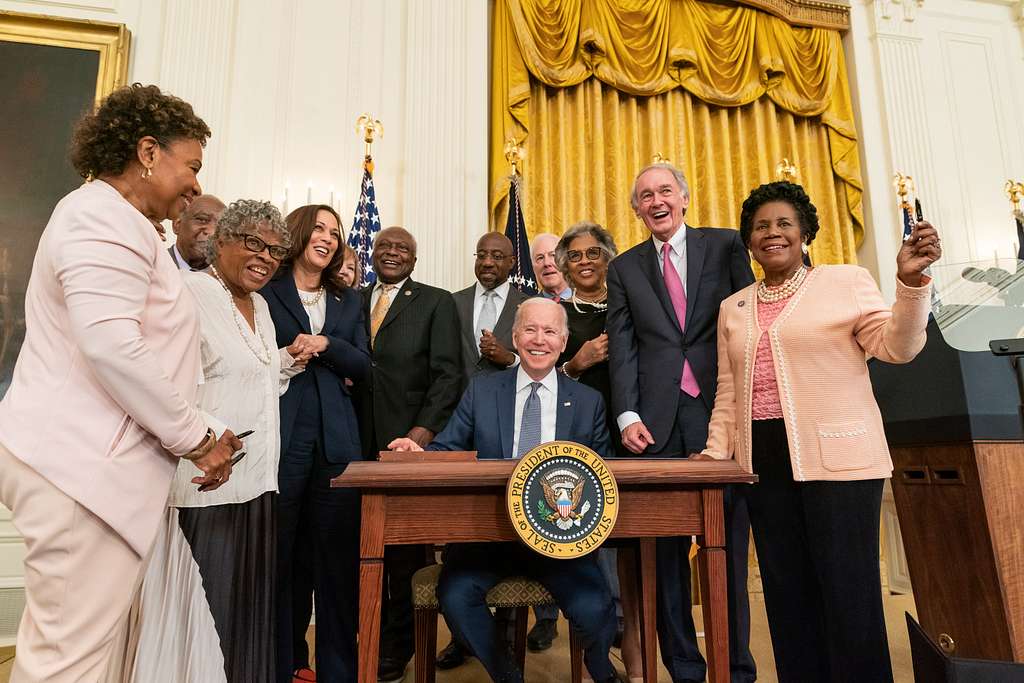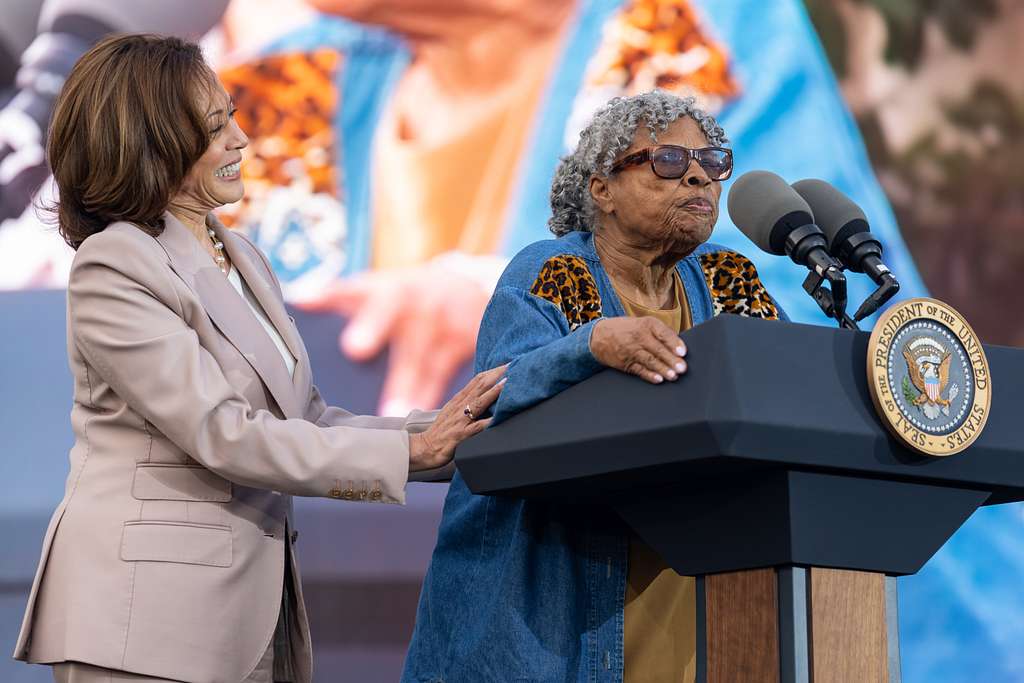
I can remember the absolute joy I felt when President Joe Biden signed the Juneteenth National Independence Day Act into law, officially making Juneteenth a federal holiday. I also recognized that, as the saying goes in the Black Community, there were shoulders upon which this historical event was carried. We have to thank Opal Lee whose shoulders were instrumental in getting this law over the finishing line.
Born on October 7, 1926, in Marshall, Texas, Opal Lee grew up in a segregated America. Her early experiences with racial injustice, including the burning of her family’s home by a white mob when she was just 12 years old, fueled her lifelong commitment to civil rights. Lee became a teacher and later a social worker, dedicating her career to educating and uplifting African American communities.
Lee’s activism took on a new dimension as she began advocating for the national recognition of Juneteenth. Her journey started locally in Fort Worth, Texas, where she organized annual Juneteenth celebrations and educational programs to raise awareness about the holiday’s significance. However, Lee envisioned a broader impact and embarked on a mission to elevate Juneteenth to a national stage.
In 2016, at the age of 89, Opal Lee undertook a symbolic walk from Fort Worth to Washington, D.C., covering over 1,400 miles. Her walk was not only a demonstration of her physical endurance but also a powerful statement of her unwavering commitment to the cause. She walked two and a half miles each day to represent the two and a half years it took for the news of emancipation to reach the enslaved people in Texas.
Lee’s walk garnered significant media attention and rallied supporters from across the country. Her journey highlighted the importance of Juneteenth and drew parallels to the broader civil rights struggles. By the time she reached Washington, D.C., Lee had become a national figure, symbolizing the persistence and resilience of the African American community.

Opal Lee’s advocacy efforts culminated in a major victory on June 17, 2021, when President Joe Biden signed the Juneteenth National Independence Day Act into law, officially making Juneteenth a federal holiday. This achievement was the result of decades of activism by Lee and countless others who had worked tirelessly to ensure that the significance of June 19th was recognized at the highest level of government.
During the signing ceremony, President Biden acknowledged Opal Lee’s pivotal role, calling her the “Grandmother of Juneteenth.” Lee’s presence at the White House was a testament to her remarkable journey and the realization of a dream she had pursued for much of her life. The recognition of Juneteenth as a federal holiday marked a significant step toward acknowledging the historical and cultural contributions of African Americans and promoting a more inclusive narrative of American history.
The establishment of Juneteenth as a federal holiday is not just a recognition of the past; it is also a call to action for the present and future. Juneteenth serves as a reminder of the injustices that African Americans have endured, and the ongoing efforts needed to achieve true equality. It is a day for reflection, education, and celebration of African American culture and history.
Opal Lee’s legacy extends beyond the recognition of Juneteenth. Her life’s work embodies the spirit of activism and the power of individual action to bring about meaningful change. Lee’s determination and resilience inspire future generations to continue the fight for justice and equality. Her story is a testament to the impact one person can have in shaping national consciousness and driving social progress.
In contemporary America, Juneteenth has become a day of both celebration and reflection. Communities across the nation observe the holiday with a variety of activities, including parades, festivals, educational events, and discussions on the history and significance of the day. These celebrations often highlight African American achievements and contributions to American society, as well as the cultural richness and diversity within the African American community.
Educational institutions and organizations use Juneteenth as an opportunity to educate people about the history of slavery, emancipation, and the ongoing struggle for civil rights. Schools, museums, and cultural centers host exhibits, lectures, and performances that delve into the complexities of African American history and the importance of remembering and honoring the past.
Corporate America has also begun to recognize the significance of Juneteenth, with many companies offering employees the day off or organizing events and initiatives to commemorate the holiday. This growing recognition within the corporate sector reflects a broader societal acknowledgment of the importance of diversity, equity, and inclusion.

While the recognition of Juneteenth as a federal holiday is a significant milestone, it also brings to light the ongoing challenges in the fight for racial equality. Systemic racism, economic disparities, and social injustices continue to affect African American communities. The holiday serves as a reminder that the work of achieving true equality is far from complete.

Opal Lee herself has emphasized that while Juneteenth is a day of celebration, it should also be a day of action. She advocates for addressing contemporary issues such as police brutality, voter suppression, and educational inequities. Lee’s message underscores the importance of using the momentum from the recognition of Juneteenth to push for further reforms and advancements in civil rights.
The recognition of Juneteenth also presents opportunities for dialogue and reconciliation. It encourages Americans of all backgrounds to engage in conversations about race, history, and the shared responsibility to create a more just society. These discussions can foster greater understanding and collaboration in addressing the issues that continue to divide the nation.
Juneteenth, now a federally recognized holiday, stands as a powerful symbol of freedom and the ongoing fight for equality in the United States. Opal Lee’s unwavering dedication and activism have been instrumental in bringing this significant day to national prominence. Her journey from a segregated Texas to the halls of the White House exemplifies the impact that one determined individual can have on the course of history.
As the “Grandmother of Juneteenth,” Opal Lee has not only secured a place for Juneteenth in the national calendar but has also inspired countless others to continue the struggle for justice and equality. Her legacy is a testament to the power of perseverance, the importance of remembering and honoring the past, and the enduring spirit of activism that drives societal progress.
In celebrating Juneteenth, we honor the resilience and contributions of African Americans throughout history. We also reaffirm our commitment to the ongoing pursuit of equality and justice for all. Juneteenth is a day to celebrate freedom, reflect on the progress made, and recognize the work that remains. Through the lens of Opal Lee’s remarkable life and achievements, we are reminded that the fight for a more just and inclusive society is a collective effort that requires dedication, education, and action.

Be the first to comment